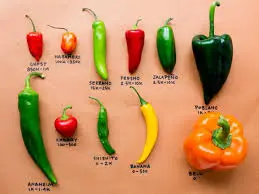Can a Dog Eat Chili Peppers? A Important Guide
As pet owners, we often find ourselves wondering which human foods are safe for our furry friends. One common food that may catch your eye is chili peppers. Known for their bold flavor and heat, chili peppers are a staple in many cuisines. But can a dog eat chili peppers? In this article, we’ll delve into the safety of chili peppers for dogs, the potential health risks, and some nutritious alternatives that you can safely offer your pet.

What Are Chili Peppers?
Chili peppers belong to the Capsicum genus and are renowned for their spicy flavor. There are many varieties, including jalapeños, serranos, and habaneros, each varying in heat levels. The heat in chili peppers comes from a compound called capsaicin, which has various health benefits for humans but can be problematic for dogs.
Nutritional Value of Chili Peppers
Before discussing whether dogs can eat chili peppers, let’s examine their nutritional profile:
- Vitamins: Chili peppers are rich in vitamins A, C, and several B vitamins. Vitamin A supports vision and immune health, while vitamin C is essential for skin and coat vitality.
- Capsaicin: This compound is well-known for its anti-inflammatory properties and potential health benefits in humans, such as pain relief and improved metabolism. However, it can cause discomfort for dogs.
- Antioxidants: Chili peppers are also a source of antioxidants, which help combat oxidative stress in the body, promoting overall health.
Can Dogs Eat Chili Peppers?
While chili peppers are not toxic to dogs, they are generally not recommended. Here’s why you should be cautious about feeding chili peppers to your dog:
1. Spiciness and Gastrointestinal Upset
The spiciness of chili peppers can cause significant gastrointestinal issues for dogs. Unlike humans, dogs do not tolerate spicy foods well. Consuming chili peppers can lead to:
- Vomiting
- Diarrhea
- Abdominal pain
- Excessive drooling
If your dog consumes even a small amount of chili peppers, you may observe these symptoms shortly after.
2. Risk of Allergic Reactions
Some dogs may have sensitivities or allergies to specific foods, including chili peppers. Introducing chili peppers could lead to allergic reactions, which might manifest as itching, swelling, or gastrointestinal distress.
3. Toxicity Concerns
While chili peppers are not considered toxic in the same way that chocolate or grapes are, their spiciness can still cause severe discomfort. In some cases, dogs may experience more serious health issues if they consume too many chili peppers or if they are particularly sensitive.
4. No Significant Nutritional Value
Though chili peppers have health benefits for humans, they do not offer any significant nutritional value for dogs. Instead of giving your dog chili peppers, it’s better to offer them foods that provide essential nutrients without the risks associated with spicy foods.
What to Do If Your Dog Eats Chili Peppers
If your dog accidentally ingests chili peppers, it’s important to monitor their condition closely. Here are some steps to follow:
- Observe for Symptoms: Keep an eye on your dog for any signs of distress, including vomiting, diarrhea, or unusual behavior.
- Provide Fresh Water: Ensure your dog has access to plenty of fresh water. Hydration may help alleviate some discomfort caused by the spiciness.
- Consult Your Veterinarian: If your dog shows severe symptoms or has consumed a significant amount of chili peppers, it’s best to consult your veterinarian for guidance.
Healthy Alternatives to Chili Peppers for Dogs
If you’re looking for safe and nutritious treats for your dog, consider these healthier alternatives:
1. Bell Peppers
Unlike chili peppers, bell peppers are mild and safe for dogs. They are low in calories and packed with vitamins A and C. You can offer bell peppers raw or cooked as a crunchy snack.
2. Carrots
Carrots are a crunchy and nutritious snack that many dogs enjoy. They are high in fiber and vitamins while being low in calories, making them an excellent treat option.
3. Green Beans
Fresh or steamed green beans are another healthy choice. They are low in calories and high in fiber, promoting digestive health.
4. Sweet Potatoes
Cooked sweet potatoes are delicious and packed with nutrients. They provide vitamins A and C and can be mashed or cut into bite-sized pieces for your dog.
5. Pumpkin Puree
Plain canned pumpkin (not the spiced pie filling) is high in fiber and can aid digestion. Many dogs enjoy its taste and find it beneficial for their digestive health.
Conclusion: Can a Dog Eat Chili Peppers?
In conclusion, while chili peppers are not toxic to dogs, they are not suitable for canine consumption due to their spiciness and potential to cause gastrointestinal distress. Instead of offering chili peppers, opt for healthier snacks like bell peppers, carrots, or green beans that provide essential nutrients without the associated risks.
If you’re ever unsure about what foods are safe for your dog, consulting your veterinarian is always a wise choice. They can offer personalized recommendations tailored to your dog’s specific health needs. By prioritizing your dog’s health and well-being, you can ensure they lead a long and happy life, free from the potential dangers of spicy foods like chili peppers.
